- Home
- Tom Savage
Precipice Page 4
Precipice Read online
Page 4
Adam practically ran down the hall to the locker room.
The young woman pulled back the clear plastic curtain adorned with comical blue and lavender fishes swimming among rampant streamers of green seaweed, and stepped out of the tub. The hot shower had been to steady her nerves, and she had let it go on for much too long. A small, discreet note above the sink requested that, due to the premium on water in this part of the world, guests’ showers be as brief as possible.
She stood naked before the foggy mirror in the steamy bathroom, inspecting her handiwork. Was everything perfect? It had better be. . . . She reached up with her hand and cleared a patch of the glass. She went through the now-familiar routine with the eyes and leaned in very close to check them. Yes . . . yes, they would do. A hand reached up to unravel the turban from the wet hair. The towel dropped to the floor.
Yes. Perfect.
She regarded the face, the slender neck, the wide shoulders and firm, round breasts. Imagine, she thought: imagine being less than beautiful. It would never have worked. None of this would have been possible. Thinking of her parents, she admitted to herself that her beauty had been inevitable, a foregone conclusion.
No, she decided. Better not to think of her parents. Not now, at any rate. . . .
She would wear the little black dress. It was a daring move—a lot of leg and a lot of cleavage. But after a thorough search through all the clothes she’d brought to the island, it seemed the strongest choice. The red sheath was too much, the peach silk not enough, and the blue suit made her look like an airline hostess. Slacks would be wrong, she felt, and jeans were out of the question. When Kay Prescott said “casual,” she was not referring to jeans. That left the pleated navy skirt and ruffled white blouse—Gidget Goes To St. Thomas—or the black cocktail dress. She’d brought one other garment with her, but it was hardly appropriate; she was saving it for a special occasion. So, the black it was, with her hair up and a single string of pearls.
She wasn’t the sort of woman who normally cared much about clothing, but tonight was special. Very special. She couldn’t just look all right; tonight she had to look sensational.
Nodding slowly to herself, she reached for the blow-dryer.
The hot, soothing spray pounded into Adam’s flesh. He could feel every muscle, every fiber of his being loosen, relax, release all tension. He never experienced what could be called stress: he had long ago conditioned his body and mind to ignore those particular impulses. That was the road to heart conditions, high blood pressure, ulcers—all those ridiculous weaknesses he would not allow himself. They were the province of the ordinary.
He stepped out of the shower and walked across the white-tiled locker room, drying his body as he went. He paused before the full-length mirror next to his locker.
He was forty-seven years old. He stood six feet five inches tall and weighed 225—and every ounce of it muscle. Well, okay, not every ounce, but more than most. His platinum hair was full and long, with barely a sign of thinning. The most magnificent-looking young man anyone in Farnsworth, Minnesota, had ever seen was actually improving with age.
Age: it was the thing he feared most. Hell, he thought with a wry smile, it was practically his only fear. One day, he knew, the advancing years would catch up with him. He would feel it in his joints and organs as the muscle and sinew he had so carefully nurtured started to weaken. His arms and legs and chest would lose their present definition and begin to sag. Well, there was only one way to face that eventuality: with a great deal of money. More than he had now. He would go wealthy, if not gentle, into that good night.
He reached into his locker and took out the clothes he would wear to dinner. Clean socks and underwear, white linen slacks, and his favorite shirt. Crisp, long-sleeved pink cotton with the monogram AP on the pocket. It was quite old, actually, but this particular shade looked good on him. Regarding the monogram, he thought about his name: Adam. He liked it. It was appropriately dramatic, appropriately large. The first person; the father of the world; the ultimate symbol of manhood.
He was pulling on his slacks when Kyle entered the room. The young man went over to a bench, sat down, and removed his sneakers.
“Hi,” Adam called, grinning. “I see we’ve both survived the Harrimans.”
“Only just,” Kyle muttered as he pulled his tank top over his head. He stood up and dropped his cutoffs.
“Sorry about that,” Adam said. “Kay’s idea, not mine.”
“Yeah.” Kyle nodded, stepping out of his underpants.
Adam looked over at the young man and spoke in a conciliatory tone. “Are you free the day after tomorrow? I’ll make it up to you. We could go over to St. John. No Harrimans, I promise. I’ll bring the beer.”
Kyle met the other man’s piercing gaze. Then, blushing, he turned away.
“Sure,” he said, heading for the shower. “Sounds great.”
Adam watched him go. The broad shoulders, the dark chestnut tan on smooth young skin, the white strip of loins and buttocks where bathing suits blocked out the sun. Beautiful, he thought. A body the equal of mine. The body of a twenty-two-year-old.
He listened as Kyle turned on the water. Then he picked up his wallet, removed two fifty-dollar bills, and walked across the room. He tucked the money into the pocket of Kyle’s shorts. He’d already paid him for the day, but this was for the extra labor of putting up with Stu and Brenda. He went back to his locker, smiling at the thought of Kyle—later tonight, perhaps, in some pub with his young friends—reaching into the pocket and discovering his serendipity.
He whistled softly to himself as he slowly buttoned the monogrammed pink shirt.
The young woman was negotiating the winding, bumpy route to Kay Prescott’s house in her rented car. To keep calm, she concentrated on the myraid flowering trees and plants that seemed to line every road on this island. Red, white, purple, yellow. More red, a particularly large flower hanging heavily from dark green bushes: hibiscus. The purple ones were frangipani. Soon, she thought, I must try my hand at painting them.
Consulting Kay’s hastily jotted instructions, she slowed as she reached the left-hand turnoff. A long, narrow gravel drive wound up a wooded hill to disappear beyond a thicket of palm trees. She glanced at the identical brass plaques that adorned the pillars on both sides of the entrance to the drive. The name of the estate was printed in Roman capitals.
She hesitated for only a moment between the stone pillars, her foot pressing firmly on the brake. Then, taking a long, deep breath, she slid the foot over to the accelerator. The pillars glided by, receded.
She was in.
One sharp turn, then another. After that the gravel road straightened, and the way stretched ahead of her in a steep uphill gradient. At the top of this hill would be the cliff, and the house that she had until now only imagined.
What would it be like? she wondered. What would they be like? Would she be welcomed into this home, entrusted with the child, accepted? She’d have to actually live here with them: the fact, assimilated long ago as a given, suddenly become real, immediate. She was here now, going through with it. She would live, reside, dwell—
Dwell. “Rather would I dwell . . .”—what the hell was that? Oh, yes: Antigone. One of her favorites. She’d recited it in a class at school. Her wicked uncle, the king, had declared her dead brother to be a war criminal. A law had been passed forbidding anyone from burying Polynices in sacred ground, but Antigone defied the proclamation. He was her brother, and they were the children of Oedipus; that was all that mattered to her. Family. . . .
She’d worn a sheet that was supposed to be a toga, and lined her eyes with kohl. Her defiance, her contempt, her hatred had filled her voice with outrage, resounding through the classroom.
“ ‘Rather would I dwell in the house of mine enemy,’ ” she’d cried, “ ‘than honor such an edict. . . .’”
Appropriate, she thought as she drove up the hill and rounded the final curve. The car burst from under the bla
nket of trees into dazzling sunlight, into the huge clearing. And there it was, at last.
Her first impression of the enormous building before her was of white stucco walls and huge expanses of plate glass, all gleaming in the sun. Sliding doors and picture windows: the architect had taken full advantage of the panoramic view. A large, flat roof, perfect for catching precious rain to add to the water supply. The giant tamarind in the center of the circular driveway, with a beige Land Rover and a beautiful white Mercedes resting in its ample shade. The riot of flowers and the wide carpets of freshly mown grass that rolled away on either side. The house, the lawn, the trees; and beyond them the precipice, and the water stretching out to the far horizon, and behind and around and above it all—up, up as far as she could see—the endless, breathtaking deep-blue sky.
It couldn’t be real. No such place could truly exist. Not on this planet.
She parked in the circle, behind the Mercedes, and got out of the car. She stood for a moment regarding the edifice before her, willing her heart to slow its wild pace and her fists to slacken at her sides. Then, resigning herself to whatever was about to happen, she walked across the cobbled path to the front door. This is it, she thought. Here I am.
Cliffhanger.
The sleek red Nissan 300 ZX flashed along the rough country roads on its way home. Adam would not have chosen so bright a shade, but then again, this was not his car. Ostensibly, yes: he had the use of it. But the Nissan, like the Kay, had been a gift. The red, she’d told him, matched her hair, and whenever he drove the car he was to think of her.
He remembered her laughter as she’d said that. It was a light laugh, a happy sound. He’d heard it since, of course. Too often.
He frowned as he drove, keeping the speedometer at a steady, illegal seventy-five. One couldn’t christen automobiles as one did vessels. It hardly mattered: the color would serve to remind him that nothing in his life right now truly belonged to him.
That house. She’d lived there with her first husband, for Christ’s sake, and she had been the one to come up with its cutesy name.
Cliffhanger. The Kay. The red-headed Nissan. Everything was Kay’s.
But not for long, he thought, downshifting as he came over the last rise before the turnoff that led up the driveway to the house. Oh, no, most definitely not for long! Something was going to change all that, and soon.
The plan. . .
With a little smile at the corners of his lips that widened as he drove, he turned the car off the main road and glided through the stone pillars with the name emblazoned in brass upon them. The red sports car carried him a very long way that August afternoon, further than he could have imagined—up the winding, palm-lined drive and into history. A history of sorts: the plan, as he called it; the scandal, as others would call it; the series of events that would later come to be known and whispered of as “that Cliffhanger business” by people—local and otherwise—who still have difficulty believing it.
THREE
WEDNESDAY, AUGUST 7
(CONTINUED)
TRISH LIKED HER immediately. At the same time, though, she was aware of that little warning bell that always sounded in her mind whenever there was a prospect of Trouble.
They had heard the car pulling up, and a few moments later Nola had brought the lovely young woman out to join them on the patio next to the sundeck. Trish made the usual automatic note of the pearls (real), the hair (dyed, but becoming), the scent (Bal à Versailles), and the black dress (Alaïa, definitely). Big brown eyes, gorgeous figure, sexy as all get-out.
Trouble.
“Lisa, Trish,” Kay said, “this is Diana Meissen.”
The young woman smiled at Trish, then turned to the child. “Hello, Lisa. I’ve been looking forward to meeting you.”
“Hi,” Lisa replied, a warm blush darkening her cheeks. “Gosh, you’re pretty! Can I call you Diana?”
“Of course.”
“I’m twelve. How old are you?”
“Lisa!” Kay cried.
The young woman laughed and sat down on a wrought-iron love-seat. “I just turned twenty-six, in April.”
Lisa plopped down beside her. “Aries?”
“Why, yes.”
“Wow!” Lisa screamed. “Aries women are the strongest in the zodiac! ‘Self-sufficient, single-minded of purpose.’ That’s what it says in my Linda Goodman. I wish I was an Aries, but I’m a Leo. August twenty-second.” She frowned, letting God and the world know what she thought of Leo.
“But you’re the lioness,” the young woman told her. “Most dignified, most graceful, and most popular. I’ll bet you’re an athlete. I’ll bet you’re the best female athlete at Antilles School.”
Trish noticed Kay’s surprised reaction.
“How did you know—” she began before Lisa cut her off.
“Yes! You read Linda Goodman, too!”
“Wouldn’t read anyone else! August twenty-second. Hmmm. Your birthday is in two weeks. We’ll have to do something about that.” She caught Kay’s eye and winked. Kay smiled.
That clinched it, as far as Trish could see. This one wasn’t a movie nut, boring the kid to death with the latest lies about Meryl Streep. This one was on Lisa’s wavelength, and the child was already in love. So, for that matter, was Kay.
And that, Trish realized was the Trouble. Hell even I like her! Three down, one to go.
Adam.
She was aware that Kay and her other friends regarded her as a somewhat frivolous woman: rich, snobbish, a bit self-centered and pampered. True, all of it. But Trish was no fool when it came to men. Unless, of course, they were men she was in love with. She could number two important politicians, an Oscar-winning actor, a bullfighter, and a Peer of the Realm among the males who had broken her heart. But she was not now, nor had she ever been, in love with Adam Prescott. Unfortunately, Trish had not seen through his initial charm quickly enough. Now, in retrospect, she regretted ever having introduced him to Kay. Well, the damage was done, and it was no longer any of her business. . . .
Even as she was thinking this, the roar of a small, powerful car reached them on the patio. A door slammed, and Adam appeared around the side of the house and came across the lawn toward them.
“Hello,” he called. “I figured you’d all be out here.” He bounded over to Kay and kissed her lightly on the lips. Then he kissed Trish on the cheek and winked at Lisa. “Hi, baby.”
“Hullo,” Lisa whispered, not meeting his gaze.
Trish watched with great interest as he at last turned his attention to the new female in his vicinity. The girl stood up, and he presented himself before her. There was, it seemed to Trish, a frozen fraction of a second as they confronted each other.
“How do you do?” he said. “I’m Adam Prescott.”
“Diana Meissen,” she replied, extending her left hand.
They shook. Then, Trish noticed, he produced his most dazzling, heart-stopping grin.
“Welcome to Cliffhanger, Ms. Meissen.”
The girl grinned, too. “Please call me Diana.”
Trish looked around at them all. The child, her enthusiasm gone, was gazing out over the water. Kay stood there, smiling her Mistress of Cliffhanger smile, that vacuous expression of those silly women in television commercials who tell you what to use on your kitchen floors. And Adam and the beautiful Diana were grinning at each other.
Oh, yes, Trish thought as she reached for her cocktail. Trouble.
It was the most beautiful house the young woman had ever seen. If she concentrated on that, perhaps her heartbeat would return to normal.
The sun was just setting behind the hills on the other side of the harbor when Kay offered to take her on a tour. She followed the woman up onto the sundeck, the now-faithful Lisa at her side. The native housekeeper, Nola, was setting five places at a table on the deck. The white linen tablecloth was held down by a large, old-fashioned gas lamp in its center, surrounded by a mound of freshly picked tropical flowers. Two torches,
one on the wall of the house next to the sliding glass doors and one in a sconce at the corner of the deck railing, whipped and fluttered in the light late-afternoon trade wind. She stared at the torches and the flowers and the gleaming cutlery, then turned around to face the view. She gasped.
Her paintbox held no such colors. The sun was barely visible on the skyline, and the air above and around it was pale lemon and peach. The next layer emanating outward was deep orange and cherry red. Then, extending up and out in all directions, came the shades she remembered from the labels of the tubes, yet so much richer, so much more alive: magenta, puce, violet, blue-violet. To the east, in the direction of St. John, the farthest reaches from the sun were already a deep indigo. In moments, she’d heard, there would be a brief, legendary flash of green, but you had to watch closely for it. Then this awesome spectrum would melt away, leaving the entire canvas a deep, velvety black.
Kay led her through the doors into the living room. Almost everything here was white and driftwood gray: the stucco walls and archways at either side; the white leather-covered couches and chairs around the glass-topped, black wrought-iron coffee table; the white area rugs tossed artfully about the gray terrazzo floor; the palegray bookshelves and home entertainment center; and the paneled foyer that led to the front door. The two side walls were covered with several large modern paintings, one of which she recognized as a Miro, and every table and shelf was accented with local carvings and statuettes of dark, shiny mahogany. Everything else, front and back, was glass. The huge invisible wall before her afforded a view of the front drive, the tamarind tree, and the forest beyond; behind her, the glass exposed the ocean. She looked up: in the center of the white-beamed, twenty-foot-high ceiling hung an enormous black wrought-iron chandelier, with more than a dozen curved branches all ending in flickering bulbs. The same color metal formed the banister of the staircase against the wall to her left, which led up to bedrooms. Under the stairs was an archway that led to Kay and Adam’s suite.

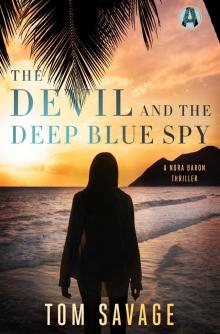 The Devil and the Deep Blue Spy
The Devil and the Deep Blue Spy Scavenger
Scavenger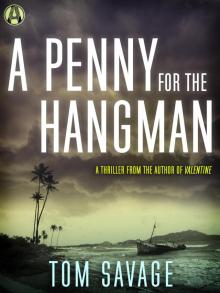 A Penny for the Hangman
A Penny for the Hangman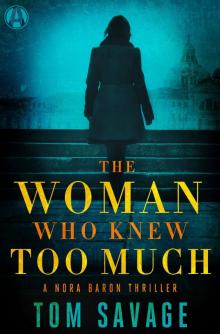 The Woman Who Knew Too Much
The Woman Who Knew Too Much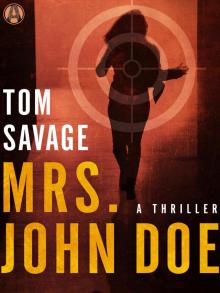 Mrs. John Doe
Mrs. John Doe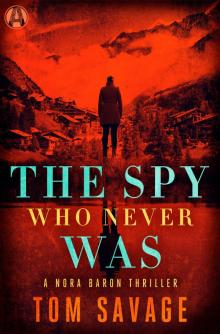 The Spy Who Never Was
The Spy Who Never Was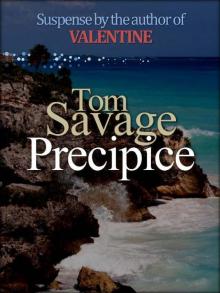 Precipice
Precipice